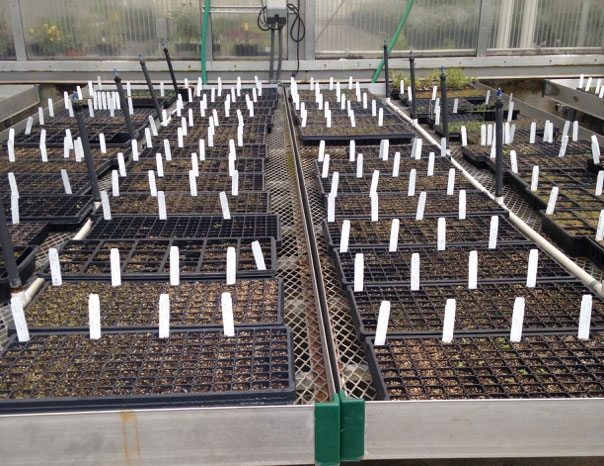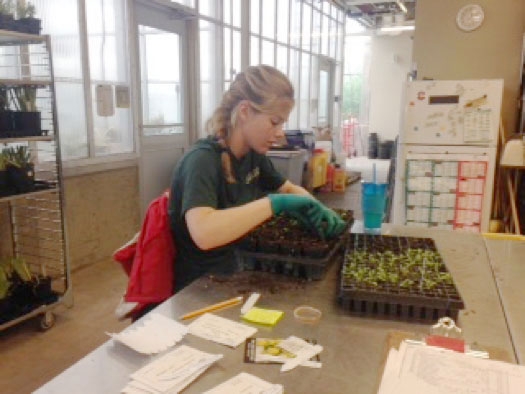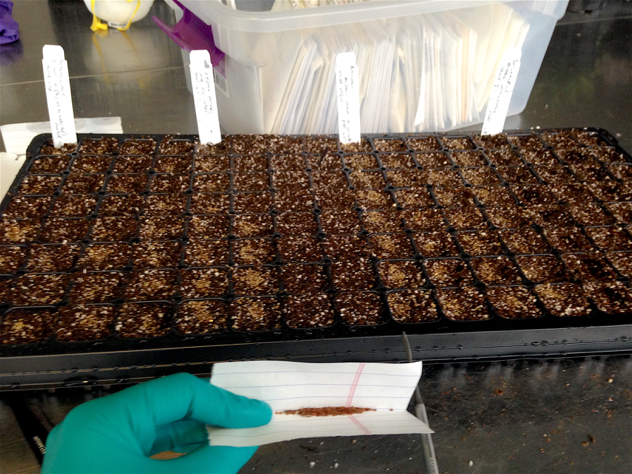Teaching Old Seed New Tricks
I am a horticulture student from the University of Nebraska-Lincoln entering my junior year. My hometown is the very small, rural town of Ulysses, Nebraska, home to maybe one hundred people. I was chosen to be the propagation intern at Denver Botanic Gardens, an experience that has proven to be unforgettable in many ways. I never fathomed what a city like Denver could be like, so my seven-hour drive to Denver was both terrifying and exciting.
When I met Senior Horticulturist Katy Wilcox-Wieczorek, I knew without a doubt that I had a special mentor. She guided me through my daily work and my intern project, answering any questions and making sure that all of our practices were at the highest standards and our methods were scientifically sound.
I did many different tasks daily including collecting seeds and cuttings from the Gardens, planting seeds, preparing seeds for long-term cold storage, cleaning seeds, preparing plant cuttings for propagation, transplanting seedlings and rooted plant cuttings, controlling insects and weeds through integrated pest management practices and lots and lots of watering.
My intern project focused on determining how well old seed germinated and had three main parts. First, I identified seed from several different plant families that we were interested in studying and that we currently had in long-term storage. Next we germinated those seeds to discover the rate of germination, and lastly we compared time in storage with the rate of germination.
I planted about 110 samples of seed (over 50 different species of plants) and collected data on germination rates, times and growth rates every Monday through Thursday. After recording and interpreting the data, I could give Katy a clear chart calculating how long she could potentially keep seed until it became unviable. It also provided data on how often she should collect seed.
This unforgettable summer was filled to the brim with excitement, entertainment, hiking and of course more knowledge and education than I could have ever dreamed. I loved every minute of it and I can’t wait to come back and visit.
I would like to thank everybody at Denver Botanic Gardens who made this opportunity possible and made this experience so incredible. I would also like to thank my host family, who was extremely welcoming and supported me 110% throughout this whole internship. I cannot thank them enough for graciously opening their doors to me. I encountered so many spectacular opportunities this summer and realized “terrifying” could translate into “momentous!”
By Propation Intern Olivia Fiala
Gallery




Comments
Reaching Sarada Krishnan
Joseph Tomocik suggested I contact you. I am going to India for the month of November and wondered where the best gardens are. Also, I hear there are jacaranda trees in many parks but I do not know how to recognize them - are there any in the Denver Botanic Gardens I could see? Is there anything you would like me to bring back for you?
Linda Lewis
Hi Linda,
Hi Linda,
Please email horticulture@botanicgardens.org to reach Sarada. Thank you!
Doris Boardman
In order to teach old seeds
In order to teach old seeds new tricks, it would be better to conform to their viability calendar, the cumulative-dissipative cycle, thanks to which they maintain their ability to germinate over time.
For instance, if you do not conform to the seed viability calendar, it is possible that, during a long cumulative period, some kinds of seeds, prone to go easily under the viability threshold, and to put themselves in stand by, until the beginning of the dissipative phase, are wrongly found unable to germinate.
Instead, by conforming to their timing, rather than to ours – say, Monday to Thursday - one may increase their germinal capacity, and eventually the plant productivity. Above all if the seeds are old.
Best regards Pietro
Botanical Garden
Hello Olivia,
I'm impress by your blog. I am neither a horticulturist nor an agriculturist but I love plants and even dream to have a farm of my own someday. Hope to read more of your study.
Sail on!
Always
Add new comment